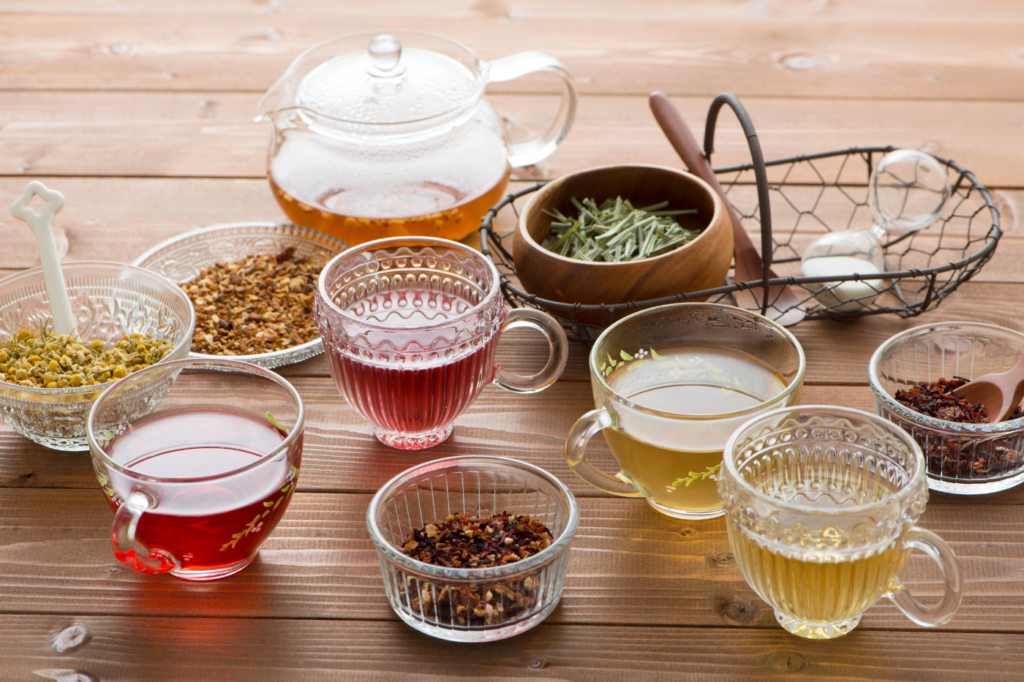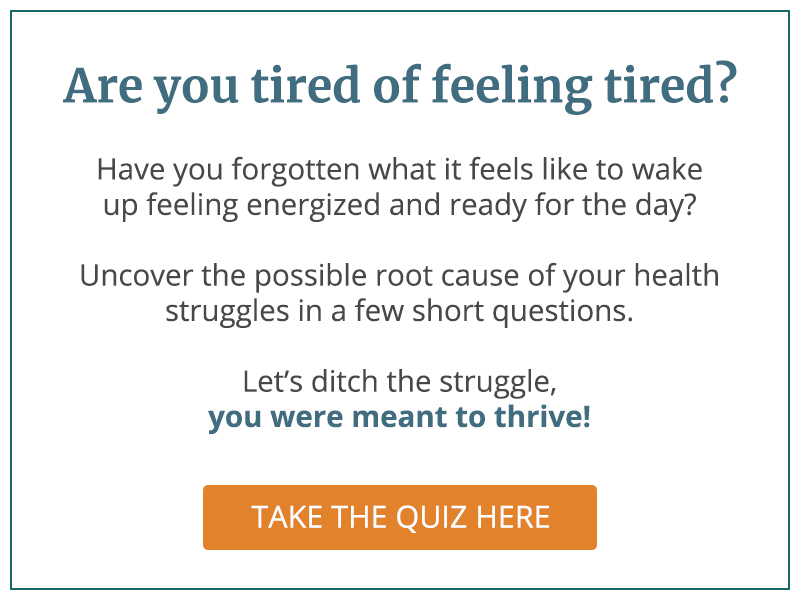I’m a huge fan of teas of all sorts, from energizing and anti-inflammatory green tea to beautiful and deep red hibiscus. Sometimes my patients are surprised when I suggest certain teas to them, but many teas have been used therapeutically for thousands of years. Nervines, a class of herb that helps to support the nervous system — are particularly effective when used in teas.
Maybe it’s the just feeling of a warm mug in your hands that helps these herbs create feelings of calm and relaxation…but there’s plenty of evidence to suggest that indulging in a cup of these nervines is a great way to unwind.
There are many types of herbal and nervine teas, but in this article, I’m focusing on a few of my favorites.
What Is A Nervine?
Before we dig in, let’s talk about nervines.
A nervine is a type of herb that can support the nervous system. This means they can be effective at helping to make you feel relaxed, lower feelings of stress, and reduce anxiety.
Nervines have been used in traditional medicine to treat anxiety, restlessness, and stress for centuries. They are known for helping to provide nourishment to the nervous system. When the nervous system is supported properly, it has an easier time dealing with stressors.
Sometimes, nervines are confused with adaptogens, which are a class of herb that also helps the body to deal with stress. However, adaptogens (like ashwagandha, rhodiola, or holy basil) have a reputation for supporting levels of stress hormones rather than the nervous system itself.

My Top 5 Herbal Teas
Herbal teas are an amazing way to get some anti-stress, anti-anxiety therapy into your life. For one, when you’re sipping tea, you’re forced to simply take a moment and relax.
If you can double your stress relief by indulging in a cup of tea filled with nervous system-supportive ingredients, all the better.
Here’s my short list of teas that I recommend to patients all the time.
Chamomile
Chamomile is well known and popular. But more than just being famous, chamomile can work wonders as a bedtime drink and more. Studies have shown that it can reduce moderate to severe generalized anxiety, and symptoms of depression when taken regularly. It also demonstrates benefits to the gut microbiome, and demonstrates anti-inflammatory properties. It’s even been studied for its ability to reduce blood sugar levels.
Milky Oat Tops
While you may have not heard of milky oat tops, they have quite a reputation for providing nervous system support. These are taken from the young plants of the oat that you probably think of as oatmeal. When prepared as a tea or tincture, milky oats can provide a gentle, soothing restoration of the nervous system.
Passionflower
Passionflower has been studied for its ability to help ease anxiety, get to sleep easier, and have better quality sleep. One study even compared passionflower’s efficacy as an anxiety treatment to oxazepam, an anti-anxiety drug.
Lemon Balm
If you love the smell of lemon, you’ll love lemon balm. Soothing and known for its ability to reduce stress and anxiety, lemon balm also has shown to demonstrate antibacterial, antifungal, and antiviral properties. Lemon balm has been praised for its ability to help you sleep. One study in children saw an improvement of 70-80% in insomnia after taking lemon balm.
Valerian
Valerian is a bit stronger than some of the other nervines I’ve included here. It has powerful relaxative properties that can help you get to sleep when you really need to. It can also help to reduce symptoms of anxiety and depression.
Using Herbal Teas And Nervines To Relax
One of the best things about these herbal teas is that they are generally considered to be effective and without serious side effects. Of course, always consult your doctor before starting any kind of herbal remedy. And be aware of any allergies you may have before indulging in a nice piping hot cup of tea.
There are so many options that are delicious — if at first you don’t find one you like, try again! Many of these nervines can be combined with each other and there are some wonderful options for nervine blends available.
Sometimes, feeling anxious or unable to sleep can be frustrating. You take the teas, you develop your nightly bedtime routine, and yet — relaxation eludes you.
Often, that leads you to feeling exhausted the next day and the vicious cycle continues.
If you’re having trouble with your energy levels and/or falling asleep at night, the problem likely has a root cause that goes a little deeper than you think.
Try taking my quiz below and see if we can start to pinpoint what’s really going on.
References
“Long-term Chamomile (Matricaria chamomilla L.) treatment for ….” 24 Oct. 2016, https://www.ncbi.nlm.nih.gov/pmc/articles/PMC5646235/.
“Chamomile (Matricaria recutita) may provide antidepressant activity ….” https://pubmed.ncbi.nlm.nih.gov/22894890/.
“A Review of the bioactivity and potential health benefits of ….” https://onlinelibrary.wiley.com/doi/abs/10.1002/ptr.1900.
“Chamomile tea: Herbal hypoglycemic alternative for conventional ….” https://www.pjps.pk/wp-content/uploads/pdfs/27/5/Special/SP-Paper-16.pdf.
“Chamomile Tea: New Evidence Supports Health … – ScienceDaily.” 4 Jan. 2005, https://www.sciencedaily.com/releases/2005/01/050104112140.htm.
“Chamomile – an overview | ScienceDirect Topics.” https://www.sciencedirect.com/topics/agricultural-and-biological-sciences/chamomile.
“Effect of a medicinal plant (Passiflora incarnata L) on sleep.” https://www.ncbi.nlm.nih.gov/pmc/articles/PMC5699852/.
“A double-blind, placebo-controlled investigation of the effects of ….” 3 Feb. 2011, https://pubmed.ncbi.nlm.nih.gov/21294203/.
“Passionflower in the treatment of generalized anxiety: a pilot double ….” https://pubmed.ncbi.nlm.nih.gov/11679026/.
“Attenuation of laboratory-induced stress in humans after acute ….” https://pubmed.ncbi.nlm.nih.gov/15272110/.
“Anti-Stress Effects of Lemon Balm-Containing Foods – NCBI – NIH.” 30 Oct. 2014, https://www.ncbi.nlm.nih.gov/pmc/articles/PMC4245564/.
“Melissa officinalis L: A Review Study With an Antioxidant Prospective.” https://www.ncbi.nlm.nih.gov/pmc/articles/PMC5871149/.
“A combination of valerian and lemon balm is effective in the ….” 12 Jun. 2006, https://www.sciencedirect.com/science/article/abs/pii/S0944711306000250.
“Valerian – an overview | ScienceDirect Topics.” https://www.sciencedirect.com/topics/neuroscience/valerian.
“Valerian for Sleep: A Systematic Review and Meta-Analysis.” https://www.ncbi.nlm.nih.gov/pmc/articles/PMC4394901/.


